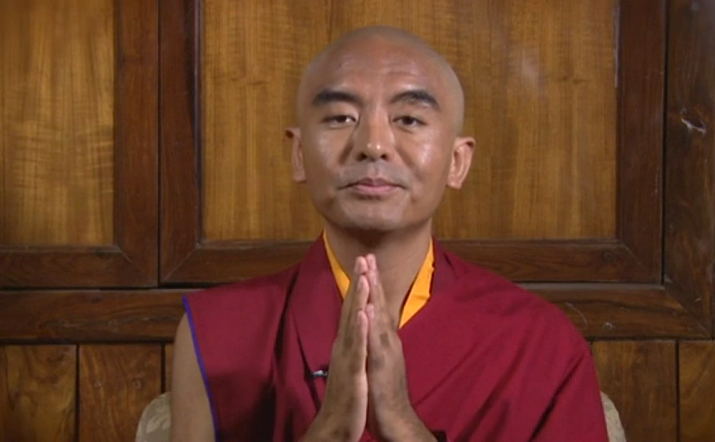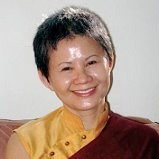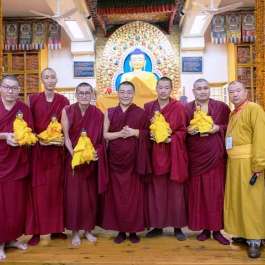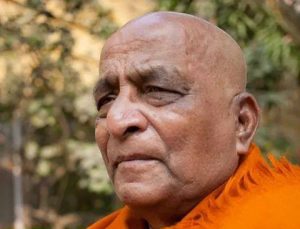
Yongey Mingyur Rinpoche, a respected teacher and master of the Karma Kagyu and Nyingma lineages of Tibetan Buddhism, released a statement today addressing recent racial unrest to his network of Tergar meditation centers across the United States. In the statement, he acknowledges the upheaval and suffering experienced by people in the US.
A longtime advocate for meditation, Mingyur Rinpoche goes on to suggest that while Buddhists meditate, in times like this, meditation and prayer are not enough. Looking at our interconnectedness with families, society, and the world, he suggested that greater change is needed. To illustrate, he used the example of the Buddha who upended the caste system into which he had been born and which had afforded him privilege in his society.
Rinpoche’s full letter reads:
Dear friends, community members, and fellow meditators,
We are living through a time of unprecedented upheaval and suffering. The global pandemic has already disrupted every aspect of our lives. As if this were not challenging enough, those of you in the United States are now witnessing and perhaps even directly experiencing the pain and anguish of communities being torn apart by the suffering of black men, women, and families that has not been truly heard, acknowledged, and addressed.
Our response to suffering is often to meditate. We meditate to see our own blind spots more clearly. We meditate to open our hearts fully to the suffering of others. And we meditate to heal our own wounds so we can truly be of service to others.
But prayers and meditation are not enough, especially in times like this. Meditation must be accompanied by wise, compassionate action.
The Buddha himself lived in a time of tremendous suffering and injustice. The caste system of ancient India was an unjust system that led to great prejudice and violence. This was the same system that gave the Buddha – as a young man – immense power, wealth, and privilege. He was a prince. He had so much to lose and nothing to gain by disrupting the caste system, yet that is exactly what he did.
When the Buddha formed his own community, he upended the age-old traditions of the caste system and allowed people from all walks of life into the sangha. It was not perfect. Women were not afforded the same status as men. But it was a revolution at the time. He did not simply pray for the suffering of the caste system to end. He used the power he had to actively change the systems of his day that were causing so many people to suffer.
Suffering takes many forms. It is true that we suffer individually. Yet the principle of interdependence helps us to see that ignorance and the suffering it creates are not merely individual experiences. They manifest in our families, our communities, and in culture and society, just as much as they live in each one of us individually.
To engage suffering with wisdom and compassion, we must look at these webs of inter-connectedness. We must acknowledge the role we are playing in the greater whole. We must use the power we have to help when we can and to support others when we cannot.
This is the example the Buddha set for us 2,500 years ago. Then, as now, there were no easy answers. Samsara is messy. The only way forward is to do our best. And although we will certainly make mistakes, if we allow ourselves to be guided by wisdom and compassion, our mistakes will lead us closer to a world that no longer values one life more than another.
Sincerely,
Yongey Mingyur Rinpoche

Born in 1975 in Nepal, Mingyur Rinpoche learned Buddhist philosophy and meditation from his father, Tulku Urgyen Rinpoche (1920–96), considered one of the greatest modern Dzogchen masters. He continued his studies at Sherab Ling Monastery in northern India. Mingyur Rinpoche has completed a series of long retreats, the most recent being a three-year retreat beginning in June 2011. He founded Tergar Monastery in 2007, one of the largest monastic complexes in Bodh Gaya, India. Today there are Tergar branch centers around the world, including one in Minneapolis, Minnesota, where George Floyd was killed last week, and more than 20 others in the US.
Accompanying Mingyur Rinpoche’s letter, the Madison, Wisconsin, Tergar board added that it “stands in solidarity with the message ‘Black lives matter.’ The recent white police brutality against George Floyd weighs heavily on all of us. We have a moral responsibility to ourselves and others to remove racism from our hearts and minds.” (Facebook)
See more
A Message to the U.S. Tergar Community from Mingyur Rinpoche – Tergar Madison (Facebook)
Tergar
Tergar Asia












